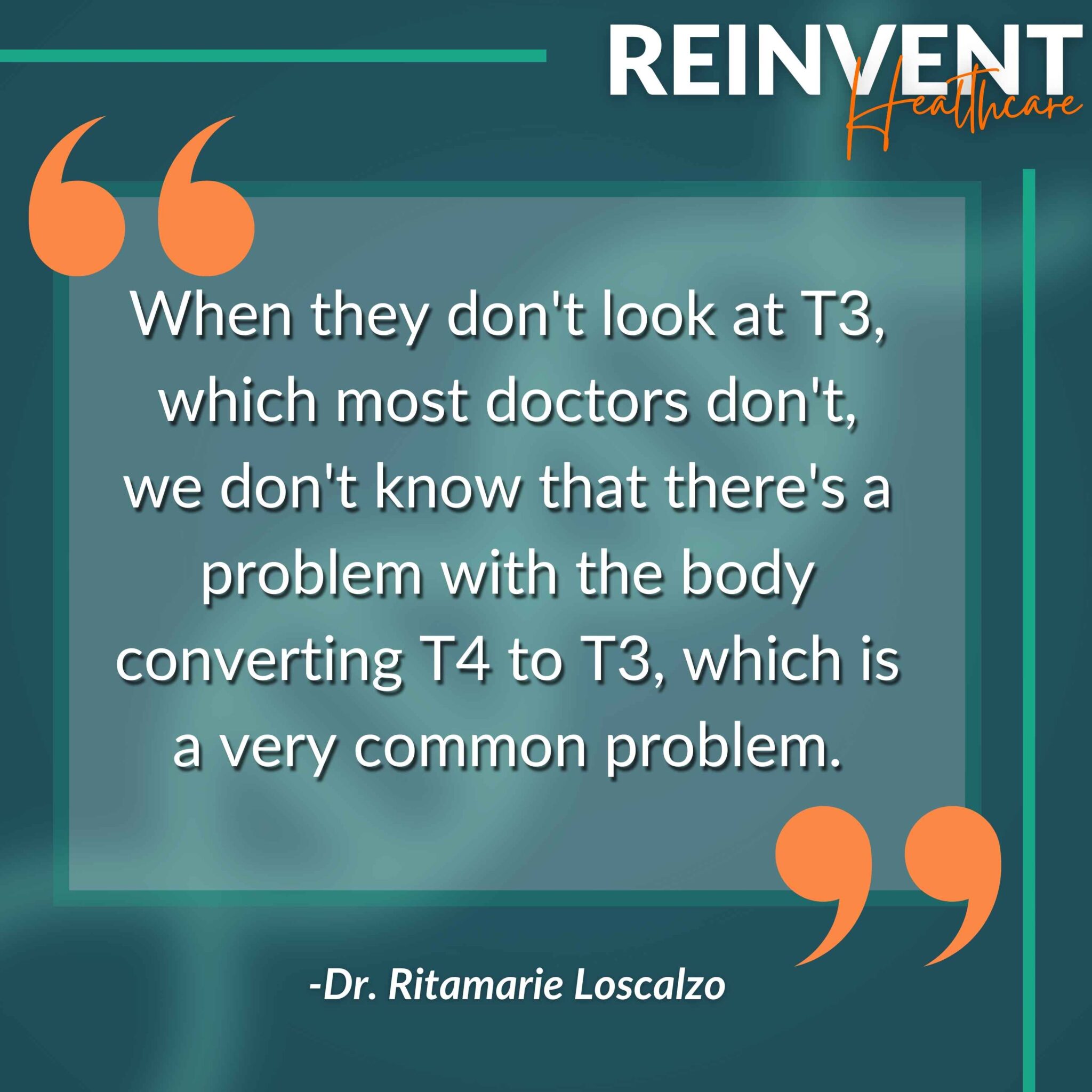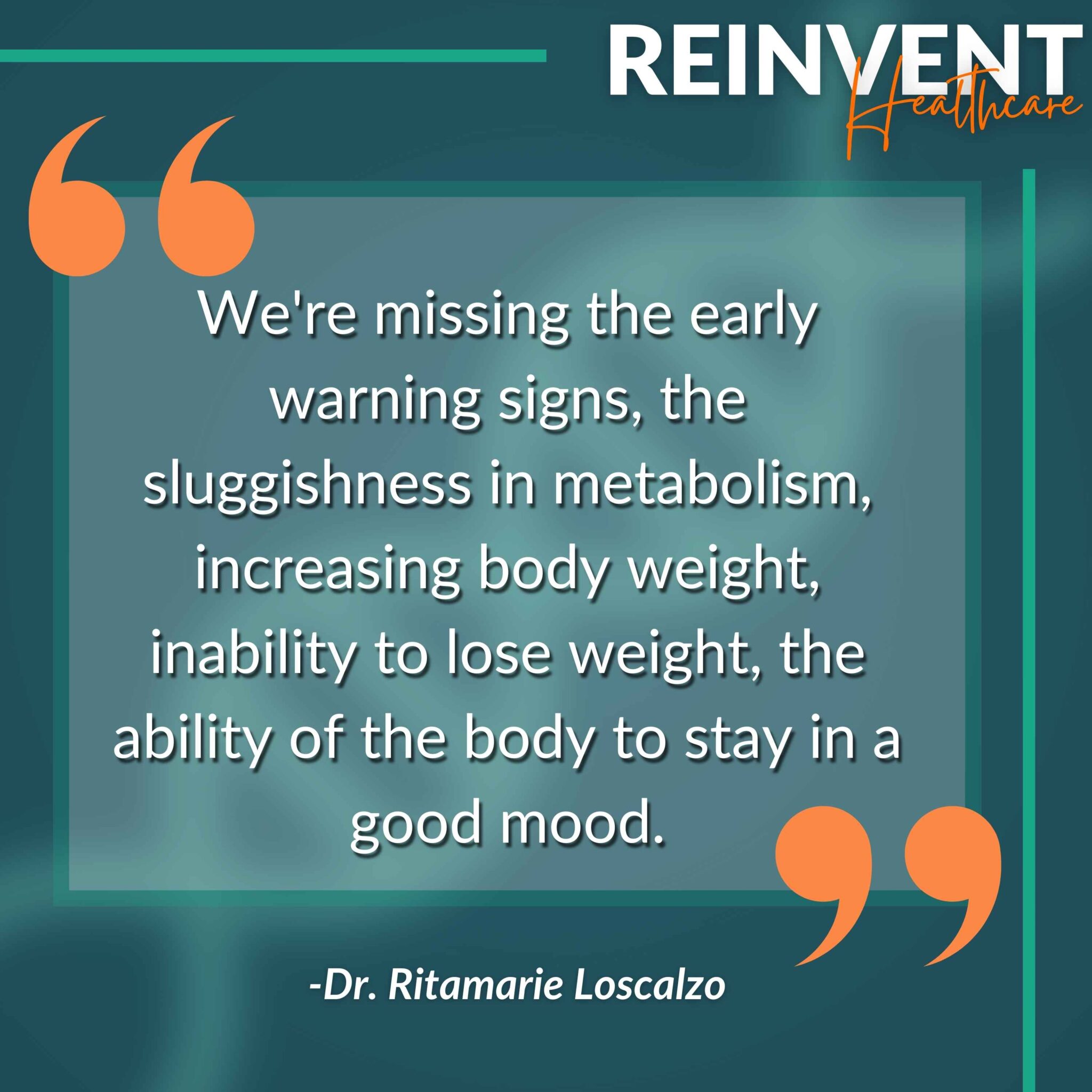Your Doctor is Wrong About Your Thyroid Problems
What if your thyroid symptoms aren’t in your head… and your labs aren’t telling the whole story?
In this episode of ReInvent Healthcare, Dr. Ritamarie Loscalzo pulls back the curtain on why most conventional approaches to hypothyroidism miss the mark—and what to do instead. If you or your patients struggle with fatigue, weight gain, depression, dry skin, or stubborn health issues despite being told your thyroid is “fine,” this episode is a must-listen.
Dr. Ritamarie breaks down the outdated medical myths that keep people sick, the overlooked root causes of thyroid dysfunction, and what functional practitioners must understand to truly help patients heal.
What’s Inside This Episode?
- The Truth About TSH – Why relying solely on TSH keeps millions misdiagnosed and mistreated.
- T3 Conversion Matters – Why looking only at T4 misses a critical step in thyroid function.
- Thyroid Resistance Is Real – Why “normal labs” don’t always mean healthy function.
- Autoimmunity and Hashimoto’s – The gut-immune-thyroid link doctors aren’t addressing.
- The Metabolic-Thyroid Connection – How insulin resistance sabotages thyroid healing.
- Your Thyroid Is Not Static – Why it can heal with the right support—and how to help it do just that.
Resources and Links:
- See the Full Transcript here
- FREE Guide: Thyroid Health Checklist – Discover the functional tests, root causes, and healing strategies practitioners need to support thyroid recovery.
- Free Guide: Magic Questions and Health Detective System – Ask better questions. Get better results.
- Join the Practitioner Community: Next-Level Health Practitioner Facebook Group
- Advanced Practitioner Training: Visit INEMethod.com for certifications and clinical tools.
- Check out other podcast episodes on Thyroid Testing here.
Transcript
Dr. Ritamarie Loscalzo
A study in 2019 found that 11.7% of the population, 11.7% of the population has hypothyroidism and it's on the rise. Today I want to talk to you about why conventional doctors are wrong about hypothyroidism. The way conventional medicine approaches thyroid conditions is all wrong. It's not hitting what people need to hit. It's not addressing what people need to address in order to help improve their thyroid status.
In fact, so many cases of hypothyroidism are under-reported. Number one, conventional doctors over-rely on TSH as a sole diagnostic marker. In fact, that's all they do. They run TSH, and as long as TSH is within what they consider a normal range, the person's sent off on their way with a whole list of thyroid symptoms and told, you don't have a thyroid problem. Take some Maalox for your constipation and take some things for your skin condition and your depression, anti-depression.
It's like a composite of symptoms that show up in an office that says, have thyroid problems. By conventional wisdom, they are just thrown out. They are thrown out, because they don't fit the specific diagnostic criteria of TSH needs to be elevated.
And on top of that, the criteria for it being elevated, TSH is a marker produced by the pituitary that stimulates the thyroid to produce thyroid hormone. And when it's elevated, it means that the pituitary has to work really, really hard, because the thyroid isn't responding well. Well, in conventional approaches, that is not considered out of range until it goes up to like 4.5 or 5, when in reality, it needs to be much lower than that for somebody to be functioning optimally on their thyroid.
Dr. Ritamarie Loscalzo (02:28)
So when we just rely on TSH, we are not catching people in early stages or even late stages sometimes. And we're not addressing what people really need to be addressing in terms of getting their thyroid back in shape.
The other thing that I see conventional doctors doing or not doing is they're ignoring early warning signs. So, someone has a low body temperature. They say they're cold all the time. And it's not really considered, that's not a thyroid problem unless you have elevated TSH, right? So we're missing the early warning signs, the sluggishness in metabolism, increasing body weight, inability to lose weight, the ability of the body to stay in a good mood, right? Everything slows down when the thyroid is sluggish. But conventional doctors are ignoring those signs and symptoms. They're not looking at the thyroid hormones themselves as being a contributing part.
So the thyroid produces T4. It's four iodines combined with a tyrosine, and that's what makes up the thyroid hormone. Usually they measure T4 if the TSH is measured to be high. You know, well, let's just double check that this is really a thyroid problem. And let's see if the T4 is depressed.
What they're failing to do is really look at the full physiology of the way the thyroid works. So T4 gets converted to T3, which is the active hormone. That's what gets into the cells and stimulates metabolism and stimulates the cells to function properly.
But when they don't look at T3, which most doctors don't, we don't know that there's a problem with the body converting from T4 to T3, which is quite frankly a very common problem. But it's not addressed in conventional medicine. And a lot of people are sent on their way, your T4 is a little bit low. Let's give you T4 and come back in six months, and we'll test your TSH again. That's not the way to handle a thyroid.
Dr. Ritamarie Loscalzo (04:41)
We need to be looking at how all the different stages are being handled. And when we don't look at T3, we miss the opportunity to help a person to convert from T4 to T3. That's not even considered in the realm of medical diagnosis is T4 to T3 conversion. Yet it's an extremely common problem. I work with a lot of people with thyroid problems. You can tell, because it's just so prevalent. In this country, 11.7% is a pretty high percentage of the population.
And when you work with people who are fatigued, when you work with people who are depressed, when you're working with people with symptoms, you've got to be looking at thyroid as a major contributing factor. And in medicine, basically they're taught, test the TSH. If the TSH is within range, send the person on their way, address all their other symptoms. So give them an antidepressant and give them something to help their dry skin. Give them something to stimulate their metabolism, caffeine, whatever. It's wrong. It's the wrong approach. And what we see is people are just not getting treated properly.
So we have the thyroid conversion, huge, huge, huge thing. The other thing that's overlooked is how the cells actually see the thyroid hormone. We can have somebody who makes a perfect amount of thyroid hormone, who has the perfect amount of T4 to T3 in ratio to each other, yet they still have symptoms. Why? Because there's something going on at the cellular level, and they are resistant. So their body is resistant.
You've heard of insulin resistance. There's thyroid receptor resistance, and it's a very common problem. And the problem with it is that it's not detectable by a lab test. It's usually the absence of all the other lab tests being out of balance, yet the person still has symptoms. If somebody has symptoms of low thyroid, like dry skin, inability to lose weight, depression, constipation. These are all signs of thyroid. And we can't just tell somebody they're crazy that they have a mental health problem when they clearly have a thyroid problem. And too many people are being gaslighted, sent away and told, you don't have a thyroid problem.
We really need to be looking at what's the root cause of this person's thyroid symptoms. It may not be a thyroid problem.
Dr. Ritamarie Loscalzo (07:04)
Failure to look at autoimmune conditions, a huge problem in Western medicine. Most hypothyroid conditions are related to autoimmune, Hashimoto's, the body is making antibodies that are creating an inability of the body to process the thyroid hormone properly. So we need to be looking at all the other systems. We can't just look at the thyroid. The thyroid can be perfectly fine, yet a person has hypothyroid symptoms, because they're either not converting properly, their thyroid receptors are not working properly, their autoimmune condition is happening where the body's attacking the thyroid or the thyroid receptors. And there's so many other things that go on. Adrenal dysfunction.
Many people have adrenal dysfunction, high stress, high cortisol levels. And those high cortisol levels damage thyroid receptors. They impede the conversion from T4 to T3. And so a person is sent on their merry way.
You don't have thyroid problems, but they're not looking at this other stuff, which is totally within people's control. Stress levels, right? You can control stress levels and get the thyroid under control. When we look at the thyroid as a part of a compendium.
Most medical doctors are not looking at the gut interaction with the thyroid. The gut is so integral in thyroid health. There are receptors in the gut. We talked earlier about the connection between thyroid conversion from T4 to T3 and low thyroid function. Well, about 25% of the conversion from T4 to T3 happens in the gut. So if somebody has an imbalanced microbiome, if someone has a leaky gut, intestinal permeability, somebody has an imbalance in their gut, they may not be converting from T4 to T3 effectively.
If they have a problem in the gut, we also end up with an increase in the number of antibodies. So Hashimoto's is very commonly affected by gut imbalance. In fact, all autoimmune diseases are found to be problematic with the gut. So we needed to be looking at the thyroid in connection with the adrenals, the thyroid in connection to the immune system, the thyroid in connection to the gut and the microbiome.
Dr. Ritamarie Loscalzo (09:28)
The other piece of thyroid dysfunction that people are ignoring, that most doctors are ignoring, because they're just not taught this in medical school, is the connection with metabolic health, the connection with insulin resistance. It's known that if somebody has insulin resistance and doesn't address it, we can't heal the thyroid. The thyroid cannot be healed.
Now, going back to conventional lack of wisdom on the thyroid, they're not really looking to heal the thyroid. They're just looking to get rid of symptoms and get the TSH to come into range. Whereas we really need to be using and looking at diet and lifestyle as factors that affect the health of the thyroid, that affect how the thyroid is actually functioning in the body. And if we're not looking at that, there's no way that we're going to get the thyroid to ever be healed.
And again, like I said, that's not usually a goal of Western medicine to heal the thyroid. It's to just get people's symptoms under control. But in reality, I've seen this over and over again. When we get the blood sugar under control, when we get the cortisol levels under control, when we support the immune system and help the person to convert and to have good receptor function, we can actually heal the thyroid.
I have worked with people; I had a client who came to see me after, I don't know, 50 years of being on thyroid medication, told she had Hashimoto's, and she came in because her blood sugar was out of balance and she was on the verge of being diabetic. She was pre-diabetic. And when we looked at her overall, and we got her on a program to balance her blood sugars and get her gut in balance, guess what happened? Her Hashimoto's went away after 50 years.
50 years on thyroid medication, she was taken off her thyroid medication. Her thyroid had healed itself. So these are all possibilities. And the problem with the conventional approach is we don't look at thyroid as something that can be healed. We look at it as something that can be medicated. And if we don't have the right numbers, we don't medicate it. And the person lives a miserable life.
Dr. Ritamarie Loscalzo (11:41)
The last thing I want to mention with relationship to thyroid dysfunction is that we look at the thyroid health as static. Somebody comes in, they have a bunch of symptoms. We do a TSH test, the TSH comes back “normal.” And I'm putting that in parentheses, quotes, because it's not normal to have an abnormal thyroid. Yeah, so I think the last thing I want to address in relationship to thyroid is that the conventional approach is to look at the thyroid health as static.
We don't look at it as something that changes over time. We don't look at it as something that gets worse when we're under more stress or gets better when we clean up the diet. We just look at it as this static thing. Once a thyroid patient, always the thyroid patient. You went on thyroid medication 16 years ago. We're just going to keep checking your levels. And as long as we still need the hormone, we just keep giving you the hormone. This is so far from a healthy approach to helping people with thyroid health.
The truth of the matter is the thyroid is not static. The thyroid is so impacted by everything else that goes on in life. It is so affected by toxins in the environment and in the food and in the air and in the water that it's very, very important that we constantly monitor and that we look at overall body conditions, and we look at optimizing overall health in order to help the thyroid to heal.
Thyroid health is such an important factor that we as health practitioners, as holistic health practitioners, as functional health practitioners need to keep in mind with everybody that comes in with symptoms that appear to be a thyroid problem, because if the person has what appears to be a thyroid problem, most likely there's a problem with thyroid function. Not saying that there's something wrong with their gland but that there's a problem with thyroid function.
And as health practitioners, as holistic health practitioners, as practitioners who really care about helping people to get to the root cause of what's going on, we need to keep in mind that we are the future of healthcare. We are the practitioners who are putting the care back into the term healthcare. We're not just about archaic methods of suppressing symptoms. We're about truly helping people to get to the root cause and help them to get well.
Dr. Ritamarie Loscalzo (13:59)
I've dedicated my life to empowering people to take back control of their health and to supporting health practitioners to truly help people get to the root causes of their issues. So if you'd like more in-depth resources to helping you to get your practice to the next level and to supporting people with thyroid conditions, then I recommend that you download our free guide to thyroid health at reinventhealthcare.com/thyroid. And until next time, shine on.








